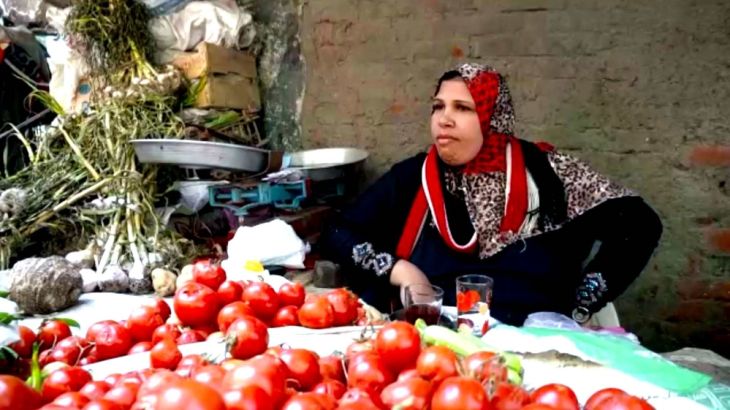
Egypt’s Women Street Sellers
The stories of five Egyptian village women supporting their entire families by selling local produce in the markets.
Shaimaa al-Sayyid grew up watching her mother and grandmother sell vegetables in the streets of Manshiyat al-Qanatir, a tourist town in Egypt. Every morning, they’d get up very early and travel to small village markets to buy vegetables which they’d sell at a higher price in the city.
Now a commerce student, Shaimaa comes straight to the market after college to help her mother Muna.
Keep reading
list of 4 itemsThirty years waiting for a house: South Africa’s ‘backyard’ dwellers
Photos: Malnutrition threatens future Afghan generations
From prisoner to president in 20 days, Senegal’s Diomaye Faye takes office
“I raised all my children here,” said Muna, “I like trading. I inherited it from my mother. She has been doing this for more than 50 years. My mother is the one who started a market in this street.”
“Around 17 years ago, I told my husband I wanted to sell vegetables in the street market with my mother. He first said ‘no’ but I then convinced him … He knows I’m doing this for a good reason. He also works hard so we can both raise our children well.”
While Muna and her husband don’t have college degrees, they’re motivated to work hard so their children can have a more comfortable life.
“I want my children to study, get university degrees and have good jobs,” said Muna.
‘Life is expensive’
Travelling outside her village, Aida Muhammad sells vegetables in Cairo’s streets in the morning but goes home to look after her children in the afternoon.
“I’m trying to earn a living to buy some stuff for my children. Life is expensive and my husband doesn’t make much. So I help him,” said Aida.
I love my job. It's how we earn our living. I would never hate it because it's how we earn our living so we don't beg or borrow money from others. It's a blessing from God.
Similarly, sisters Sanaa Sayyid Ahmed and Nanaa Sayyid Ahmed spend four days a week selling cheese, eggs and garlic in Cairo and only two days a week at home with their families. Their village is more than a day’s travel away, so they’ve managed to rent an unfurnished apartment just to sleep in.
Finding the perfect location on the street to sell her vegetables used to be a problem – until one day other vendors came to her rescue.
“The butcher told us not to sit next to his shop,” Sanaa said. The butcher was worried that her products would attract flies. Then, the other vendors shouted back, “Let her stay. She’s trying to earn a living. She sells great cheese and eggs. It’s your meat that attracts flies.”
Besides the hustle, Sanaa isn’t bothered by haggling customers. “When we state the price, the customer starts to barter. This is business. Bargaining and headaches,” said Sanaa. “I have no fears as long as the scales I weigh the cheese on are working well and aren’t broken.”
Cheese and ghee (clarified butter) seller Ilham Abdul Aziz is a childless widow who selflessly provides for her impoverished sister, unemployed brother-in-law and the rest of their family.
She’s had many opportunities to remarry, but she’s steadfastly refused. Instead, said Ilham, “I wanted to dedicate my life to these children and support them until they all get married. People praise me, saying I’ll be rewarded for dedicating my life to these children.”
“I love my job. It’s how we earn our living,” she added. “I would never hate it because it’s how we earn our living so we don’t beg or borrow money from others. It’s a blessing from God.”
This film focuses on the daily lives of five Egyptian village women who are driven by the need to provide for their children and families by selling local produce in the street markets across the country. It provides an insight into the women’s daily struggle to survive and the sacrifices each of them makes to sustain their livelihoods, just above the poverty line.